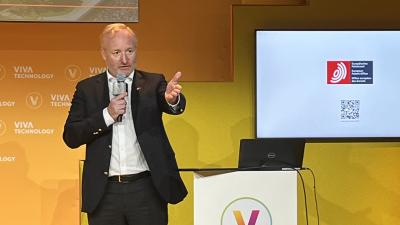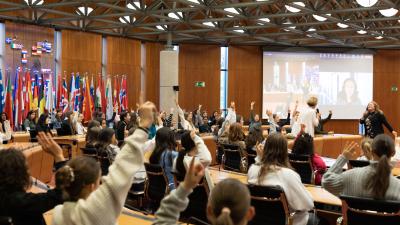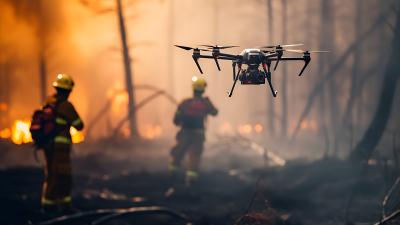CodeFest on Green Plastics: Finalists announced
The European Patent Office (EPO) has announced six finalists for its first ever public CodeFest. Towards the end of 2022, some 60 individuals and teams took up the challenge: to write an AI code that improves access to patent information on green plastics, helping to rid the planet of plastic waste.
Each finalist will present their creative code at an online award ceremony on Thursday 23 February 2023 at 14.00 hrs CET, where the winners will be revealed. The ceremony will also highlight how the finalists' AI solutions could contribute to the United Nations Sustainable Development Goals (SDGs), particularly to responsible consumption and production (SDG 12).
Meet the finalists
The winner will receive a EUR 20 000 cash prize, with the second and third place finalists each receiving EUR 15 000 and EUR 10 000 respectively. With internal competitors from the EPO, external entrants from across Europe and several mixed teams, which solution will take a coveted spot on the podium?
The solutions use various techniques, including neural networks, gradient boosting machines, transformer models, fine-tuned language models, and a sequence-to-sequence approach. Here are the six finalists; a full list of team members and full summary of each solution is available on the official event page, where you can also register to attend the award ceremony (see below).
- AI4EPO, Greece and Netherlands
This team's model uses state-of-the-art AI pipelines and large language models from OpenAI for zero-shot, few-shot and other approaches to arrive at a custom MLP neural network for binary and multi-label classification.
- Green Hands, Netherlands
As there is currently no classification scheme or labelled data available in this field, Green Hands proposed a new classification scheme, and developed a strategy to automatically assign labels to patents in order to create a labelled training dataset.
- IP.appify, Germany
Using a gradient boosting machine, Thomas Eißfeller focussed on high sample efficiency, unbiased validation metrics and maximising specificity.
- Multimodal Patent Document Classification, Germany and Netherlands
This team created a deep learning architecture to classify patent documents by fusing features from figures and text, thus exploiting the multimodal nature of patents.
- Nikolaos Gialitsis, Greece
Nikolaos developed a machine learning model that incorporates both semantic and lexical features, and that was trained on a dataset of patents and scientific publications.
- Patent Variables, France, Germany and Switzerland
The team converted the problem into a sequence-to-sequence challenge, asking the user to define green plastics and then testing any patent claim against that definition.
About the code challenge
An extremely high level of submissions was received in response to the code challenge, which was: To develop creative and reliable artificial intelligence (AI) models for automating the identification of patents related to green plastics.
The competition, open to anyone aged 18 or over and resident in one of the EPO member states, included over 30 participating teams representing diverse nationalities. The finalists were selected by a jury consisting of senior specialists from across the EPO working in sustainability, IT, data science and AI, as well as patent information and analysis.
Further information
Official CodeFest event page (register to attend the online award ceremony)
Related items

EPO President speaks at Viva Technology 2024 in Paris, EPO experts show how patents help turn ideas into reality and enable access to finance

Inspiring the next generation of female inventors and women in STEM

Exhibition on firefighting technologies inaugurated in Sežana

Flagship conference highlights quality as a shared responsibility

Join the challenge to classify patent data for a sustainable future

Transforming the way we access and use patent data

New study and free tool reveal vital role of academic patents for European innovation

AI and intellectual property were key topics during the EPO’s mission to Budapest, where delegates joined a conference and held bilateral talks

With 120 participants from 33 countries, the jury has many deliberations ahead

PATLIB2024 conference in Türkiye focuses on Strategic Plan 2028, digitalisation and support for SMEs
EPO President ushers in new era for PATLIB network, participates in high-level meetings and signs Memorandum of Understanding with METU

A unique insight into life at the EPO for talents with disabilities

Use generative AI to transform the way users access and leverage patent data

The 2024 winners represent Europe, Asia and Africa, with women inventors featuring prominently

United in diversity at leading LGBTQIA+ festival

Event covers Chinese patent law, EPO-CNIPA pilot and fosters mutual understanding

The renowned British chemist is honoured for her groundbreaking work in mass spectrometry, advancing drug discovery and personalised medicine

Focus on quality, digital tools, services for SMEs and how the Unitary Patent changes the innovation landscape in Europe

EPO supports Pride month with a series of initiatives in Munich

Finalists from Tunisia, Ukraine and the Netherlands, contribute to sustainability, healthcare and technological advancements for mobility aids.

A new platform on space technologies, a report on space propulsion and updates to our Deep Tech Finder, will be presented in today’s free online event

EPO President speaks at Viva Technology 2024 in Paris, EPO experts show how patents help turn ideas into reality and enable access to finance

Inspiring the next generation of female inventors and women in STEM

Exhibition on firefighting technologies inaugurated in Sežana

Flagship conference highlights quality as a shared responsibility

Join the challenge to classify patent data for a sustainable future

Transforming the way we access and use patent data

New study and free tool reveal vital role of academic patents for European innovation

AI and intellectual property were key topics during the EPO’s mission to Budapest, where delegates joined a conference and held bilateral talks

With 120 participants from 33 countries, the jury has many deliberations ahead

PATLIB2024 conference in Türkiye focuses on Strategic Plan 2028, digitalisation and support for SMEs
EPO President ushers in new era for PATLIB network, participates in high-level meetings and signs Memorandum of Understanding with METU

A unique insight into life at the EPO for talents with disabilities

Use generative AI to transform the way users access and leverage patent data

The 2024 winners represent Europe, Asia and Africa, with women inventors featuring prominently

United in diversity at leading LGBTQIA+ festival

Event covers Chinese patent law, EPO-CNIPA pilot and fosters mutual understanding

The renowned British chemist is honoured for her groundbreaking work in mass spectrometry, advancing drug discovery and personalised medicine

Focus on quality, digital tools, services for SMEs and how the Unitary Patent changes the innovation landscape in Europe

EPO supports Pride month with a series of initiatives in Munich

Finalists from Tunisia, Ukraine and the Netherlands, contribute to sustainability, healthcare and technological advancements for mobility aids.

A new platform on space technologies, a report on space propulsion and updates to our Deep Tech Finder, will be presented in today’s free online event

EPO President speaks at Viva Technology 2024 in Paris, EPO experts show how patents help turn ideas into reality and enable access to finance

Inspiring the next generation of female inventors and women in STEM

Exhibition on firefighting technologies inaugurated in Sežana
